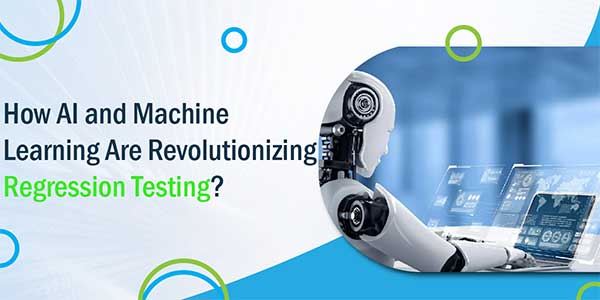
Regression tests are a major part of app testing cycles that are run on apps and other software types. Regression tests are important just like other tests of the cycle because they check the integrity of the code to a great extent, especially after changes are made to the code blocks after development.
For example, if the app has issues and the development team changes the code to some extent, regression testing services ensure that the app functions properly despite the changes in its structure. The market for regression testing experts will increase with time and reach a value of USD 6.8 billion by the end of 2032.
Regression tests are important, so the best practices in regression testing are adapting to the use of AI and ML-powered regression testing tools for better productivity and results.
Table of Contents
What Is Regression Testing?
When an app is developed, even after development or through the continuous development approach, it undergoes some changes. These changes are made to ensure that the application is the best version of itself when it reaches the market.
However, the code blocks that are added or eliminated might hurt the overall application framework. The app testing team then has to run tests to check for the integrity of the app code so that it functions under different conditions and does not change drastically despite changes in other areas.
Regression testing services are important for running the app with its core functionalities, even when there have been changes in some parts of the code. In this article, you will come across different approaches to app testing in the regression mode.
There are two modes; one is the manual regression testing process, which the testers have to design and carry out on their own. They use tools but do not use automation or AI capabilities to assist the test. The traditional approach is a time-consuming process and needs the expertise of human testers. On the other hand, there is an automated testing process that goes forth with the use of automated tools like AI and ML-powered ones. This approach is faster and goes ahead with highly specialized testing tools.
Traditional regression testing methods are time-consuming, and these methods also suffer delays because of human errors. The traditional regression testing method is fully manual, and the dependency on human workers is 100 percent.
The time and effort needed to acquire the resources are too high in scale. The productivity level of the testing team when running regression tests manually is also not optimal or high.

How AI And Machine Learning Are Transforming Regression Testing?
1.) Test Case Prioritization:
There will be multiple test cases to design and run under the regression test cycle for an app code or website. The process of test case prioritization is when the testers design the test cases and plan for them so that high-priority tests happen first and low-priority ones happen later on. Test case prioritization is done to ensure that the regression testing cycle runs smoothly and efficiently.
The team of a Regression testing company uses ML and AI-powered tools to prioritize the test cases based on historical data analysis, risk assessments, and test case execution costs. Critical areas and high-risk areas are tested first to avoid risks that can blow up into problems. The test cases are also run based on the impact the test case has on functionality.
2.) Test Case Generation:
The use of AI-enabled tools by regression testing companies can help generate faster test cases. The test case generation steps are very extensive and cannot be completed traditionally. It could be riddled with human errors. For repetitive and large volumes of test cases, it is easier to use AI and ML-enabled tools. AI-enabled tools can ensure that the app code is tested with almost full test case coverage. Even edge cases and risks can be covered with AI-powered automation tools for regression testing.
3.) Test Suite Optimization:
AI-powered tools can analyze the test scenarios, functionalities, and dependencies of the app to check for the kind of tests that might be redundant and unnecessary for the regression test cycles. With the help of insights and analytical algorithms, the AI-powered tool determines which test cases can be omitted and removed. The tools eliminate the old test cases that are no longer needed and code for new tests that are needed in future cycles.
4.) Anomaly Detection:
The AI and ML-powered testing tools can also be used to check for the anomalies detected during the testing process. The AI and ML algorithms can analyze the historical and generated data to determine the chances of test failure. The intelligent tool looks for areas in which anomalies have happened and where potential bugs could be found. This helps in the early identification of bugs so that debugging happens quickly and the app has its full functionality. Bug detection and quick debugging are some extra features of these regression testing tools.
5.) Smart Test Execution:
One of the best features of smart AI testing tools is how the tools can adapt to the kind of tests run and are needed for the cycle. The AI tool adapts to the kind of tests needed for the next cycle and identifies the cases that should be executed first. It can smartly organize the tests and ensure their rapid execution so that the app is thoroughly tested and only relevant tests are run in an optimized condition. This reduces the use of extra resources and streamlines the testing workflow to a great extent.
Benefits Of AI And Machine Learning In Regression Testing:
1.) Efficiency And Speed:
The use of AI-powered tools by regression testing services helps improve the overall efficiency and speed of executing the test cases for the cycles. A large number of tests need to be run on complex app code, and this takes a lot of time compared to the traditional process. However, the use of AI-powered automated tools can increase the speed of this process, which is rapidly going towards test completion. The regression test team completes its tasks more efficiently.
2.) Cost Reduction:
The setup of a paid AI testing tool might be costly. However, the use of AI tools is under best practices in regression testing. The use of AI and ML tools reduces the dependency on human testers in the long run. Such tools prioritize the tests and only run the relevant tests. Thus, the cost of running regression tests is reduced in the long term. The cost of using an AI tool in the long term is less than maintaining a human testing team at its full strength. Thus, the regression testing company saves a lot of money and effort over traditional testing approaches.
3.) Improved Accuracy:
AI tool usage for testing also comes under the Best practices in regression testing because such tools help identify edge cases and high-risk areas. With such capabilities, the accuracy and efficiency of the test cycles improve. The team can achieve its goal with high test coverage and minimal human error when AI-powered tools are used in the right testing areas.
4.) Scalability:
Automated tools with AI capabilities for regression testing are highly scalable and useful. Such tools can be used by small businesses or integrated with an enterprise. The versatility of the AI testing tools when conducting regression tests at any point is an advantage that companies want to secure with a modern approach. The tools are adaptable and can also be part of the CI/CD pipeline so that there is a rapid approach to market for the finished digital product.
5.) Continuous Improvement:
Most of the AI ML tools that are used in regression testing have self-healing capabilities and learn from analyzed scenarios. You do not have to worry about training the tool again and again, as it can work on its own and assist in future testing cycles with higher accuracy than human testers who have a less adaptive learning curve.
Future Of AI And Machine Learning In Regression Testing:
As mentioned in the first half of this blog, the use of AI and Machine learning in regression tools is here to stay. The use of regression tools is forecasted to increase. Experts are seeing a growth in adaptive regression tools that can integrate with other tools in the testing environment. The new-age tools can integrate with DevOps and RPA to create a fully automated and robust testing environment for complex apps. There is a need to use best practices in regression testing so that AI-powered tools can be integrated into the testing environment for the testing cycles. The human testers will also quickly adapt to the new demands of the regression testing scenario.
Struggling With Bug Fixes? Let Us Handle Your Regression Testing Needs!
The role of AI/ ML capabilities in the regression testing scene has been growing. Machine learning and AI tools can be programmed to a great extent to automate and optimize regression testing. Companies need to adapt to this testing trend so that their test results and cycles are accurate and optimized to get the best app product possible.

 About the Author:
About the Author:











Be the first to write a comment.